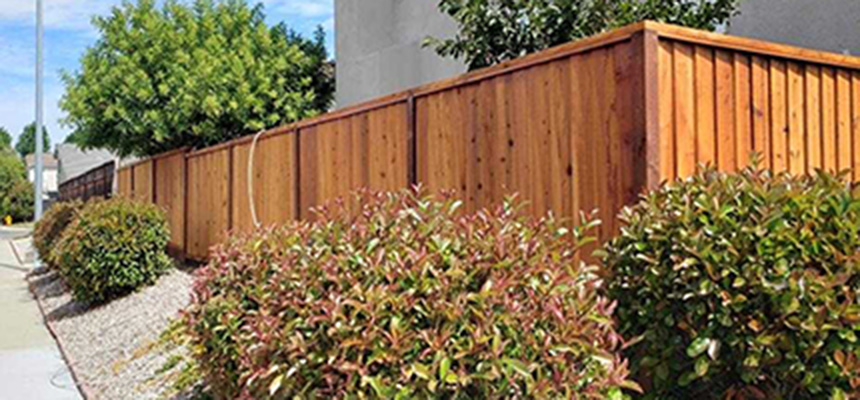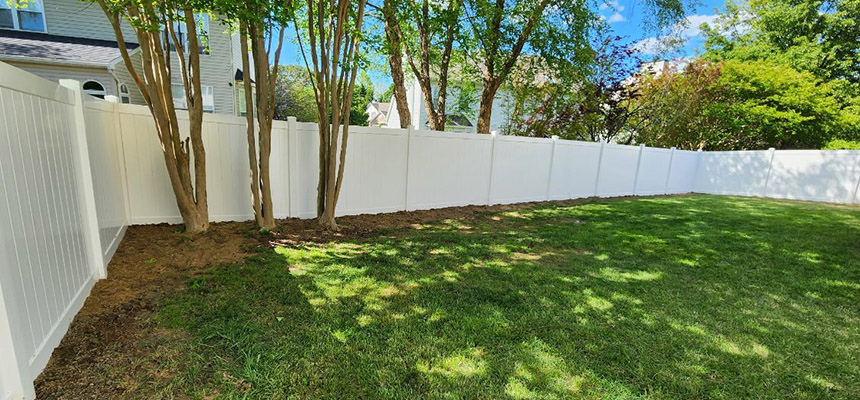Aluminum fences are a popular choice for homeowners looking for a durable and low-maintenance option to enclose their yards. The cost can vary depending on factors such as the height of the fence, the type of fence panels used, and the linear footage of the fence. Additionally, labor costs and installation fees will impact the overall cost of an aluminum fence project. In this blog, we will provide a complete guide so you can properly estimate the cost of your new fence!
As with any fence type, there are a variety of styles to choose from for aluminum fences as well, each with its unique benefits and costs. In this section, we will explore the average aluminum fence installation costs associated with each of these popular styles.
A powder-coated aluminum fence is a sleek and modern option that can add a touch of charm to any property. This is a common/standard aluminum fence type and typically ranges in price from $10 to $30 per linear foot. A powder-coated fence is a great investment for those looking for a sleek and modern look without the high maintenance of other fence materials.

Ornamental aluminum fences are a popular choice for those looking for a more decorative option. These fences can range in price from $15 to $60 per linear foot. This type of aluminum fence comes with a lot of customizable options and the cost goes up as you add more detail to your fence, such as decorative posts and intricate designs.
For those seeking maximum privacy and security, a privacy aluminum fence may be the ideal option. This type of fence typically ranges in price from $25 to $40 per linear foot. The cost of this privacy aluminum fence is higher due to the additional material needed compared to other styles.

Several key factors influence the final price of an aluminum fence project. Here's a simplified breakdown—from most to least impact:
Labor is often the biggest expense. Hiring a professional installer can add up to half of your total project cost, depending on local rates and complexity. DIY can save money but takes time and precision.
Gates are significantly more expensive than standard panels—especially driveway or automated gates. A basic single-swing gate is most affordable; custom or double-swing gates cost much more.
The longer and taller your fence, the more you’ll pay in materials and hardware. Each additional foot adds cost linearly.
Upgrading from standard to ornamental or privacy styles increases the price due to heavier materials and more complex designs. Decorative accents like finials or scrolls can add 10–20% to the total cost.
Thicker panels are more durable and cost more. Residential grade is least expensive. Light commercial and commercial grades are stronger—and pricier.
Standard colors like black or white are most affordable. Custom or textured finishes cost more, especially if extra coatings are needed for weather protection.
Posts and caps anchor the fence and add visual appeal. Heavier-duty posts or decorative caps increase cost slightly, especially for taller or longer fences.
Some cities require permits for fencing. Costs range from free to several hundred dollars depending on local regulations. Always check with your city or county before starting installation.
Adding decorative features to your fence can increase the overall cost due to the additional labor and materials required. For example, adding ornamental accents such as finials, rings, and scrolls can increase the price by 10-20%. Similarly, opting for a custom color instead of a basic black or white could add 20-30% to your bottom line.

Here are some of the additional costs you may encounter when installing an aluminum fence.
While metal fences like wrought iron fences, steel fences, and aluminum fences are sometimes considered maintenance-free, they need a little maintenance every once in a while. Pressure washing is one aspect of that maintenance and can have a significant effect on aluminum fence costs. It is important to note that the type of pressure washer used, as well as the size of the area being washed, are essential factors when considering how pressure washing affects aluminum fence pricing.
The cost of metal fence installation is not limited to just the fence itself. The installation supplies, such as mounting brackets, screws, concrete, and power equipment, can significantly impact the overall cost of the project. You would need mounting brackets to secure fence panels to posts and these are typically sold separately. Screws are necessary for securing the brackets to the posts and panels. Additionally, power equipment such as augers or other post-hole diggers may be required for digging post-holes. To get a better sense of the costs of the fence installation supplies or to shop everything in one place, click the image below!
.jpg)
Brush and fence removal is an additional cost to consider when installing an aluminum fence. If you have an existing fence that needs to be removed, you will incur additional costs for the removal and disposal of the old fence. The cost of fence removal will vary depending on the size and type of fence, as well as the amount of brush or vegetation that needs to be cleared. If a professional removal service is required, this could also add additional labor costs and material costs. In some cases, the removal of brush or trees may also be necessary, which can also add to the overall cost.
Sloping land, uneven ground, and other challenging terrain require more time and effort to install than flat land. For instance, if you choose to install an aluminum fence on steep terrain, you might need additional posts or galvanized brackets to secure the posts firmly in place. This could increase your installation costs significantly. Factors such as soil type and grade, slope, topography, and vegetation can also contribute to a higher fence cost. For example, softer soil types like sand or silt are easier to dig for postholes than harder surfaces like rock or clay.
On average, an aluminum fence can last anywhere from 20 to 30 years. The fence is resistant to rust, corrosion, and weather damage, making it ideal for use in heavy footfall areas. To ensure your aluminum fence lasts for as long as possible, it's important to keep it clean, inspect it regularly for damage, and make any necessary repairs promptly.
Wood fences tend to be much cheaper than aluminum ones due to their relatively low cost of supplies and labor. In addition to initial installation costs, maintenance also plays a major role in determining which option is more affordable over time. the maintenance costs of a wood fence over time can add up due to potential rotting, warping, and termites. On the other hand, an aluminum fence requires little to no maintenance, which can save you money in the long run.
Yes, an aluminum fence can be painted. Painting aluminum fences is an effective way of protecting them from these elements which can reduce the need for costly repairs later on.
On the positive side, aluminum is one of the most durable materials available for fencing. It is relatively strong yet lightweight, corrosion-resistant, and requires minimal maintenance. In addition, it has a long lifespan that makes it an economical option in the long run. Another advantage is that aluminum fences come in a variety of styles and colors which allows homeowners to customize their property’s appearance without sacrificing security. On the downside, aluminum fences tend to be more expensive than other fencing options, and they are not as strong as steel or wrought iron fences. Additionally, they do not provide as much privacy as some homeowners may desire with their privacy fences.
 Fence Costs
Fence Costs Fence Costs
Fence Costs Fence Costs
Fence Costs